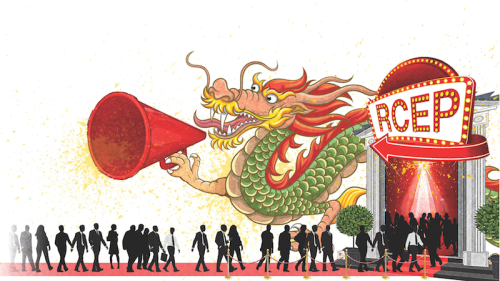Business Standard | 24 June 2016
China-backed Asean opposes India’s stand on RCEP
by Subhayan Chakraborty
China is said to have triggered a sudden impasse in the recent trade negotiations on the Regional Comprehensive Economic Partnership (RCEP) in New Zealand. It led to some nations, particularly those belonging to Association of Southeast Asian Nations (Asean), pushing for dismantling of the three-tier system followed in the initial round of offers for goods liberalisation.
As part of India’s current three-tier approach to tariff reduction, the Asean countries are being offered 80 per cent tariff liberalisation. Of this, 65 per cent elimination of tariff will come into force immediately after the agreement is implemented. Another 15 per cent tariff elimination will happen over a period of 10 years. In the second tier, India has offered 65 per cent tariff elimination to South Korea and Japan, with whom it has free trade agreements (FTAs). These two countries offered 80 per cent tariff elimination to India. In third tier, India has proposed 42.5 per cent reduction in tariff lines to China, Australia and New Zealand. These countries will offer India 42.5 per cent, 80 per cent and 65 per cent tariff lines reductions, respectively.
The ten-member Asean group, representing more than half of the participants of the proposed RCEP, submitted a paper against single tariff in the talks held last week in New Zealand. Sources said the latest turn in talks took place after a direct interference by China, which has allegedly goaded the Asean members to junk India’s approach of selective trade liberalisation.
However, there was also a rift in Asean nations over this. “China, having demanded greater tariff reduction before also, pushed Asean members Laos and Cambodia into opposing India’s approach, which was later followed by Malaysia and Indonesia,” said one of the sources tracking the development. However, Philippines and Singapore were not on board, he added. The Asean nations want to see the agreement through as soon as possible and are being played by China against India for leverage over negotiations on services where India has taken an aggressive stance, said a commerce ministry official.
“While other countries have formally argued against the multi-tier approach earlier also, Asean nations have pointed out the entire value chain is not being covered in India’s stand,” said an expert. However, he said the scope of the current talks was decided much before and the discussion on the value chains has been dealt earlier.
The Asean nations include Indonesia, Malaysia, Philippines, Singapore, Thailand, Brunei, Cambodia, Laos, Myanmar and Vietnam. Apart from Asean, the RCEP involves six countries with whom Asean has free trade agreements (FTAs) — Australia, China, India, Japan, South Korea, and New Zealand. Japan and China had earlier pressed India for either common tariff for all member countries in 10 years or to make the initial tariff liberalisation more ambitious. India had asked Japan to find common ground on the issue.
The upcoming round of talks, to be held next year in Indonesia, is expected to see a hardening of stance from all countries. The RCEP countries account for almost a third of world’s gross domestic product (GDP), at $23 trillion, and 20 per cent of global services trade, while covering more than three billion people.
Since negotiations were formally launched in November 2012, there have been 13 rounds. Topics for discussion include trade in goods and services investment, intellectual property, rules of origin, and sanitary & phytosanitary (SPS) measures, among others.
